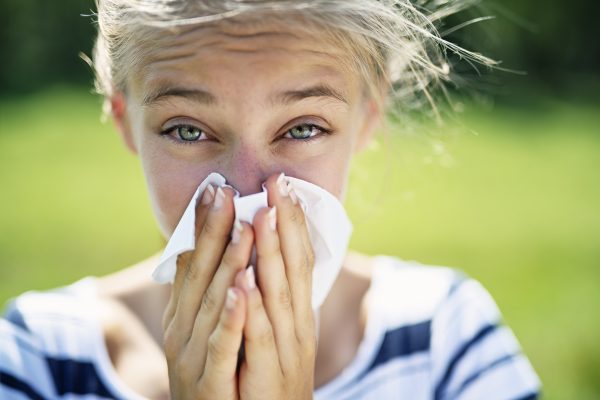
Learn when allergy seasons – spring (tree pollen), summer (grass pollen) and fall (ragweed/weed) – peak in northeast Ohio.
Before COVID-19, parents wouldn’t think twice about sending kids to school with a sniffle and some tissues. Now, deciding whether a stuffy nose is from pollen or the onset of COVID-19 is a real concern for families.
“Allergies are very prevalent in the general population. It is not uncommon for patients to experience various nasal and eye symptoms as the seasons change,” said Lisa Sammon, DO, pediatric allergist/immunologist at Akron Children’s. “For those with pollen allergies, the most telltale symptom is itching of the nose and eyes in addition to congestion, clear drainage and sneezing.”
COVID-19 symptoms can cause nose congestion, sneezing and, at times, clear, watery drainage; however, it does not typically cause itching that worsens in the setting of an environmental trigger.
“In the early phase of the pandemic, COVID-19 was often associated with anosmia or loss of smell but this has changed as newer variants have emerged. Severe, uncontrolled allergies may also cause loss of smell due to chronic inflammation,” said Dr. Sammon. “While nasal symptoms may be unreliable, allergies are not accompanied by fever despite the popular namesake, ‘hay fever.’ Ultimately, one should take a COVID-19 test or reach out to a provider for guidance.”
COVID-19 is a contagious respiratory illness caused by a viral infection that can cause a wide range of flu-like symptoms whereas seasonal allergies are triggered by airborne pollen and primarily lead to sneezing, runny or itchy nose, nose congestion and itchy or red eyes. Some allergy sufferers with asthma may also have coughing and wheezing, but typically seasonal allergies affecting the nose don’t cause shortness of breath or difficulty breathing, which is the case with COVID-19.
Allergy relief
If you know your child has seasonal allergies, the best treatments can be discussed with your provider, but may involve daily doses of oral antihistamines, nose sprays and eye drops. Dr. Sammon explains the benefits of each:
- Nose sprays such as fluticasone, or triamcinolone work well to treat sneezing, itching, congestion and dripping. They work best if taken daily.
- Eye drops are fast-acting and work well as needed. They work best if taken daily, if needed.
- Oral antihistamines such as loratadine, cetirizine or fexofenadine treat sneezing and itching, but not as well as nose sprays. They do not treat nose congestion or dripping.
Dr. Sammon also points out that while masks may not completely prevent allergen exposure, wearing one may also help reduce seasonal allergy symptoms due to the irritant effects from pollen.
As kids change, so can their sensitivity to allergens. If you suspect your child has allergies, speak with your primary care provider to determine if testing is recommended. By knowing which allergy triggers are the worst for kids, parents can try to manage symptoms and lessen the stress a stuffy nose can bring in a world with COVID-19.
If your child presents with COVID-19 symptoms or you think he’s been exposed to COVID-19, keep him home and contact your primary care provider. For allergy testing, diagnosis and treatment, contact Akron Children’s Center for Allergy and Immunology at 330-543-0140.










